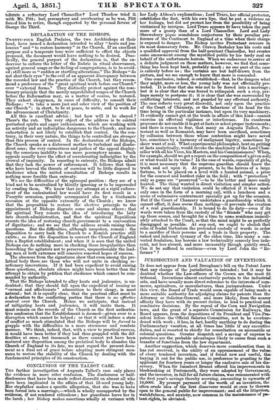DEC - CARA TION OF .1111, Blb.H.OPS.
TWENTY-FOER English Prelates, the two Archbishops at their head, have issued a declaration intended to allay "heats and jea- lousies and "to restore harmony" in the Church. If an excellent purpose and a temperate tone were sufficient to effect the objects proposed, the document would leave nothing to be desired. Prac- tically, the general purport of the declaration is, that the en- deavour to enforce the letter of the Rubric in ritual observances,. against general usage or the feeling of congregations, is to be avoid- ed ; still more so "sudden or startling alterations." The Bishops " do not shuttheir eyes "to the evil of an apparent discrepancy between the recorded law and the practice of the Church, but they recom- mend a preference of the "great spiritual work before our Church" over "external forms." They distinctly protest against the reac- tionary principle that the merely unprohilnted usages of the Church before the Reformation may, as a matter of course, be restored. They exhort clergymen, in cases of difficulty, to consult their Bishops ; "to take a more just and sober view of the position of our Church"; in short, to be at peace, to unite, and to work fbr the advancement of Christianity.
All this is excellent advice : but how will it be obeyed ? There's the rub. The very object of the address is to control perturbed spirits and eager enthusiasms, which are working with an activity and an indiscipline dangerous to the Church ; and mere exhortation is not likely to establish that control. On the con- trary, in their very nature, the things to be controlled. are stronger than this process of control. In the declaration of the Bishops, the Church s..aks as a distressed mother to turbulent and disobe- dient sons; the very earnestness and pathos of the appeal display- ing the conscious inability to use more peremptory means. Suck appeals usually have the effect of corroborating indiscipline by the avowal of impunity. In resorting to entreaty, the Bishops admit that they lack the power of enforcement. It follows that those who have braved the threats of coercion will be little disposed to obedience when the united consultation of Bishops results in nothing more forcible than entreaty.
We see the difficulties of the episcopal position : they are of a kind not to be neutralized by 'blindly ignoring or to be superseded by evading them.. We know that any attempt at a rigid enforce- ment of the ecclesiastical law would have its first result in a Puseyite secession, possibly accompanied also by a Gorhamite secession at the' opposite extremity of the Church; we know that the proposition to restore the elective principle to the appointment of Bishops disgusts some and alarms others ; that the spiritual Tory resents the idea of introducing the laity into church-administration, and that the spiritual Republican resents the idea of restoring church-government to a convocation of dignitaries ; and we see that the address avoids raising these questions. But the difficulties, although unspoken, remain : the disposition to carry back the Church to a Romish practice still exists ; so does the disposition to convert the Church of England. into a Baptist establishment; and when it is seen that the united Bishops can do nothing more in checking those irregularities than beseeching the agitators not to persevere, unquestionably the lead- ing
men at both extremes will conceive renewed hopes of success,
The absences from. the signatures show that even among the pre- latical body there are those who will not unite in. checking re- actionary innovations. If it had been expedient to avoid raising these questions, absolute silence might have been better than the attempt to obtain by petition that obedience which cannot be com- manded by authority.
That the Bishops intended to allay heats and jealousies, is un- doubted; that they should fall upon the expedient of issuing an "earnest and affectionate" admonition to their clergy, is most natural ; but it is equally clear, that the practical effect must be a declaration to the conflicting parties that there is no effective control over the Church. Hence we anticipate, that instead of mitigating heats and jealousies, it will incite them. It Iliust remain on the records of the Church as the first authorita- tive confession that the Establishment is doomed—given over to a disruption which cannot be helped or that it will induce a state of conflict so much stimulated that the Bishops will be forced to grapple with the difficulties in a more strenuous and resolute manner. We think, indeed, that, with a view to practical success, it w-ouhl have been better if they had thus grappled with the dif- ficulties at once; but inasmuch as there cannot yet have been matured any disposition among the prelatical body to abandon the Church of England to its fate, we must regard the present docu- ment as a final act of grace before adopting more stringent mea- sures to restore the stability of the Church by dealing with the fundamental principles of its construction.






























 Previous page
Previous page